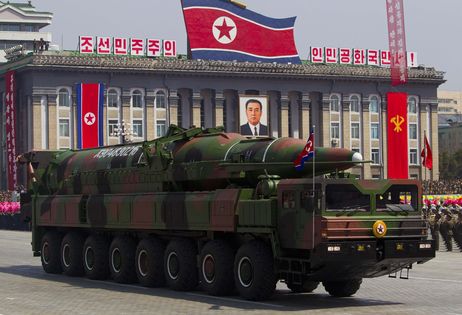June 13, 2012
THE ASAHI SHIMBUN (Japan)
Japanese government sources have confirmed that a Chinese
company exported four large vehicles capable of transporting and
launching ballistic missiles to North Korea last August, which would be a
violation of a United Nations Security Council resolution.
While the Security Council mandate prohibits the sale of major
weapons systems to Pyongyang, the official Chinese government position
continues to be that it has never broken such a resolution.
Because the United States, Japan and South Korea need Chinese
pressure on North Korea to prevent it testing a nuclear weapon for the
third time, the three governments have not pressed Beijing on the issue,
sources said.
On the urging of the United States, the three governments
also decided not to publicize the shipment of the vehicles to avoid
publicly embarrassing China.
The Japanese government obtained a document last October that recorded the export of the vehicles from China to North Korea.
The four vehicles believed to have been exported were likely the same
ones that were prominently displayed by North Korea at a military
parade in April commemorating the centennial of the birth of Kim Il
Sung, North Korea’s founder.
According to several Japanese government sources, the four vehicles were transported aboard the 1,999-ton Harmony Wish, a cargo ship registered with Cambodia.
Spy satellites of Japan, the United States and South Korea have
confirmed the ship left Shanghai on Aug. 1, 2011, and arrived at Nampho
in western North Korea on Aug. 4.
On Oct. 3, the Harmony Wish anchored in Osaka Port. At that time,
officials of the 5th Regional Coast Guard Headquarters, based in Kobe,
Hyogo Prefecture, conducted an on-board inspection and discovered the
detailed document of the export of the vehicles that was issued by the
exporting agent in Shanghai. A report was passed on to the Cabinet
Intelligence and Research Office via Japan Coast Guard headquarters.
According to the document, four large WS-51200 transport vehicles
with a total length of 21 meters were transported after completion in
May 2011 by a subsidiary of the China Aerospace Science and Technology
Corp., which is affiliated with the Chinese military.
The Chinese military normally uses the WS series of off-road vehicles
to transport ballistic missiles. The 51200 model is believed to be a
modified version of the 12-wheeler 2900 model. The 51200 was turned into
an 16-wheeler and was likely developed to transport the Dongfeng 31
intercontinental ballistic missile (ICBM), which has a range of about
8,000 kilometers.
Wuhan Sanjiang Import and Export Co. is listed as the shipper of the
vehicles. Wuhan Sanjiang is believed to be affiliated with China
Aerospace Science and Technology.
While a North Korean trading company was listed as the recipient, the
company does not exist in files on weapons export companies held by the
Japanese government, leading officials to believe it was a paper
company created to get around economic sanctions.
Japan passed on the intelligence it gathered from the Cambodian ship to the United States and South Korea via the Foreign Ministry.
At the April 15 military parade held in Pyongyang, eight 16-wheeler
transport vehicles carried what appeared to be ICBMs. Because North
Korea does not have the technology to develop such vehicles on its own
and because the vehicles were very similar to the WS-51200, officials of
Japan, the United States and South Korea decided that the four vehicles
shipped from China were among the eight.
The three nations concluded the import of the four vehicles was a
violation of U.N. Security Council Resolution 1874, which bans the
export to North Korea of all weapons and related materials except small
arms and light weapons. The resolution was adopted in response to
Pyongyang’s second nuclear test in 2009.
U.S. officials informally passed on such information to their Chinese counterparts in April.
Sources said while Chinese officials admitted for the first time to
the export of the vehicles they also said the exports were intended for
civilian use to mainly transport large pieces of lumber.
However, because there are no Chinese trade records of the export of
the four vehicles, some intelligence sources said Chinese officials may
have used that explanation about civilian use to fend off criticism,
since the WS series of off-road vehicles were developed with the
capability of being able to raise ballistic missiles into launch
position.


No comments:
Post a Comment